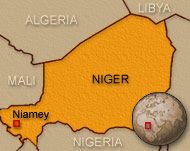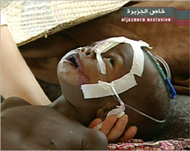Niger famine appeal falls on deaf ears
Famine and malnutrition in Niger have reached critical levels while appeals by both the country’s prime minister and the UN have failed to garner a response.

Aljazeera’s correspondent in Niger, Abd al-Qadir Ayadh, travelled to De Maradi province 750km to the east of the capital, Niamey, to report on the crisis.
Niger Prime Minister Hama Amadou told Aljazeera: “There has been no international response to yesterday’s appeal that Niger is facing serious famine.”
“The food crisis affects some three million people,” he added.
“A silent crisis is looming in Niger,” the UN office said last month. “All indicators point towards increased poverty due to population increases, desertification, locust infestations and rain shortfalls.”
The UN Office for the Coordination of Humanitarian Affairs said on 2 June: “To date, not a single dollar has been pledged to the flash appeal.”
The effort, launched on 19 May, sought $16.2 million from governments to help feed 3.6 million people in need of aid after a locust infestation and recurring droughts in the western African country.
Anguished appeal
The UN request was followed at the weekend by an “anguished appeal” from Amadou for urgent assistance to help the people of the region.
Meanwhile, Doctors Without Borders/Médecins Sans Frontières’ (MSF) has set up therapeutic feeding centres in Madarofa village, one of the worst hit areas.
The organisation says severely malnourished children from the southern areas of Niger are entering MSF centres at an alarming rate.
Dr Koki Taki from Doctors Without Borders told Aljazeera: “Some children die on their way to the centres since mothers bring them while they are on the verge of dying.”
|
“We are eating anza leaves, which normally we feed our cattle” Habibu Yacubu, |
Some mothers come to on foot from isolated areas, he said.
A nurse from Doctors Without Borders added: “The situation is very critical. I am talking about daily malnutrition. I stress that the situation is getting worse so these children should be helped and something should be done.”
About 61% of Niger‘s population lives well below the bread-line, less than one US-dollar a day, Ayadh said.
International human rights organisations have also raised concern over the deteriorating situation in Niger, saying the efforts exerted are insufficient, he added.
Children under five
Among the needy are 800,000 children under age five, including 150,000 who suffer from severe malnutrition.
Lack of food in rural Niger is forcing farmers off their land and into cities, to find money and food to send back to their families.
“We’re all coming to the city in the hope of finding work, so we can send money back to the villages,” said Maliki Ali, newly arrived in Niamey.
“We are eating anza leaves, which normally we feed our cattle,” said Habibu Yacubu, an unemployed 43-year-old man.
“But now, even those leaves are going scarce, and besides, they make our children sick with diarrhea. We are hungry all the time, every day.”
World’s poorest
Already among the world’s poorest countries, the vast desert state’s food-supply problems have been compounded by years of drought and last year’s invasion of desert locusts, the worst in more than a decade, which wiped out much of the country’s cereal production.
 |
|
The UN says Niger is the second |
Niger has a population of approximately 10 million, of 63% live below the poverty threshold, and of these 34% live below the extreme poverty line. One child out of four dies before the age of five, according to the World Food Programme.
Niger, classified as both a least developed and a low-income, food-deficit country, was ranked the second lowest country in the world (173rd out of 174 countries) by the UNDP Human Development Index for 2000.
The country also recorded a deficit of more than 200,000 tonnes of millet, maize and sorghum over the last harvest season, according to official statistics.
Government: No free food
The government on Friday squashed any notion that food would be distributed free to the country’s citizens teetering on the edge of a food crisis that could affect about three million people.
The reaction followed a rally by several thousand people on Thursday demanding free food stocks and blasting the government for turning a blind eye to their plight.
 |
|
Up to 3.6 million people are |
Protesters marched in Niger‘s capital, Niamey, demanding free food and carrying signs reading: “We’re hungry, help us.”
Government spokesman Mohamed Ben Omar said at the time: “What civil society is asking is poorly conceived and irrational. The state of Niger cannot engage in such a foolish adventure.”
“How can we distribute the little that we have, and for free?”
Emergency food aid
Demonstrators also declaimed the government decision in January to raise taxes to 19% on staples such as milk, flour and sugar, which they said were a slap in the face to the already impoverished populations.
The rally also aimed to draw attention to the mistreatment of Fulani herders in the north who come under regular attack by nomadic Tuareg, who allegedly steal their cattle.
Hoping to stem the effects of the food crisis that has already put about 800,000 people at risk of serious malnutrition, the government has engaged in a promotional sale of cereals in the most at-risk areas.
But drought and last year’s invasion by desert locusts have slashed the vast northwest African state’s production by more than 200,000 tonnes, leaving a deficit that the UN World Food Programme estimates will require about $16 million in emergency food aid.